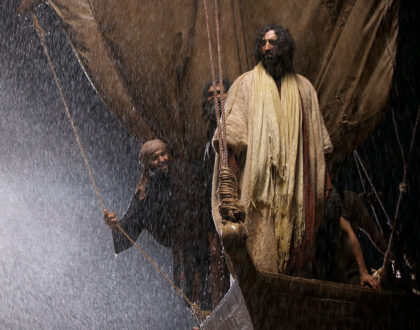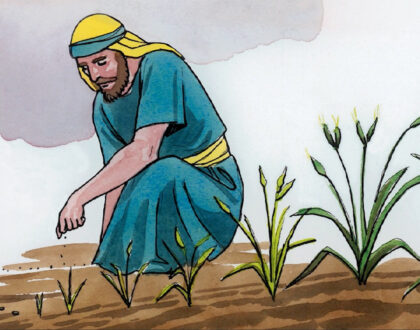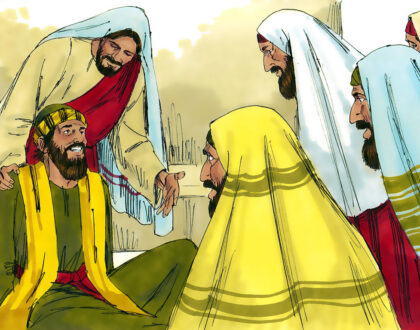The Greatest Miracle of Christ is the Forgiveness of our Sins
“The Greatest Miracle of Christ is the Forgiveness of our Sins”
Archbishop Loren Thomas Hines
Fourth Sunday in Ordinary Time
June 12, 2016
Readings: 2 Samuel 11:26-12:10, 13-15; Psalm 32
Galatians 2:11-21
Luke 7:36-50
We are challenged by God’s great love for us. We either forget or don’t really care about giving God the right expression of thanksgiving for all that He has done for us. We are challenged by today’s Gospel. How do we respond to the miracle of life that God has given us? Life is the fullness of God’s Kingdom lived out everyday in our lives. If we don’t live this way, we are really dead. Even if we’re physically alive, we may as well be dead if we don’t walk in the provision of God and instead, allow our problems to rule our lives. Christ gave us life, and this life is so much more powerful than death. This is why for those who embrace this life from Christ, physical death is not the end but a fulfillment of God’s plan for us.
In the Gospel, we are introduced to Simon the Pharisee, a well-respected Jew with a healthy amount of curiosity about Christ (about the miracles He had performed and why He had so many followers), even if he didn’t really believe in Christ. To satisfy his curiosity, he invited the Lord to dine with him in his own home. The Lord entered the Pharisee’s house and reclined at the table. (This was how the Jews took their meals in those days, reclining at the table, maybe because they dined for a long time.) As the Lord was reclining at the table, this woman “who was a sinner” came in. The Gospel doesn’t tell us how she got in, but it’s a strange thing that she was allowed inside. Maybe she had been there before because this was the home of an important man and the servants wouldn’t just allow anybody in. The woman went to the Lord directly, went down on her knees weeping and began to wet the Lord’s feet with her tears and kept wiping them with the hair on her head, and kissing them and anointing them with perfume. In those days, women covered their head, but this woman let down her hair, even if it was against tradition, and used it to wipe the Lord’s feet. When she learned that the Lord would be at the Pharisee’s house, she brought with her an alabaster vial of perfume, which cost the equivalent of a whole year’s earnings (in those days, perfumes were very costly because they were made by hand). She brought this costly perfume to wash the Lord’s feet with.
There is a lesson and challenge for us in what the woman did for the Lord. She was a prostitute, but she was giving up her profession for Christ, obviously after having heard His teachings. Having decided to turn her back on her trade, she still went ahead and used up all her savings to buy the perfume for the Lord. She didn’t think of herself and the future, of how she’d survive and what she’d live on. She laid everything she had at the Lord’s feet. With her giving and gesture, she gave great respect to the Lord, as if she was saying, “Great is the Lord! I want to take part in Your journey; the journey for the salvation of the world”.
On the other hand, Simon the Pharisee judged both the Lord and the woman, asking in his mind why the Lord allowed the woman to do what she did: “If this man were a prophet He would know who and what sort of person this woman is who is touching Him, that she is a sinner” (Luke 7:39). Christ knew his thoughts (we must be careful about the thoughts we entertain because the Lord can read our minds). To answer the question which Simon was probably afraid to voice out, the Lord told the story of two men who owed a moneylender, one owed 500 denarii, and the other fifty, and how the moneylender forgave both. Simon agreed that the one who owed more will love the moneylender more.
Contrary to the culture/tradition of their day, Simon did not wash the feet of the Lord when He came in. As courtesy to guests, their feet would then be anointed with oil after they are washed. Simon didn’t do any of these for the Lord, and this is why we know that he didn’t believe in the Lord. The Lord also said to Simon, “You gave Me no kiss; but she, since the time she came in, has not ceased to kiss My feet”. Kissing to welcome a guest was also a common courtesy in those days. Imagine the aroma of the perfume as it wafted through the house. This aroma was an expression of love and gratitude to the Lord.
Jesus said to the woman, “Your sins have been forgiven”. The Law does not have a provision for forgiveness; it is purely legalism, a list of what not to do. Simon was judging and condemning the woman. He may even have used her in the past, but to his mind, this was her sin, not his. This is how we think when we are judgmental – it’s always somebody else’s sin, never ours. The greatest miracle of Christ is the forgiveness of our sins. He did this on the cross. The whole community judged the woman as a BIG sinner; Christ forgave her. Simon couldn’t see her repentance, only her sin, and so he condemned her. This is a picture of the Church today – there’s too much legalism, a long list of what to do and what not to do – when its work is to forgive and tell people that God is greater than the Law. God loves even the most hardened criminals. Pope Francis has opened the door of the Church to sinners – to gay people and others. Proverbs tell us that he who remembers the sins of the past dies, unable to live in the joy of the Kingdom. Life in Christ is not about condemnation, but forgiveness and love.
Jesus said something to the woman that confronts us today: “Your faith has saved you; go in peace” (Luke 7:50). We always say “Christ saved me”, but this salvation must first be received by us, by faith. This is why every time Christ healed someone, He would say, “Your faith has healed you”. This tells us that God has given us everything we need, and that if we will only receive them and step out in faith, we will overcome the problems and challenges that come our way. We should always see the problems with eyes of faith. I believe that most of our sicknesses are caused by a lack of faith. Faith conquers. Without it, hope cannot work.
The woman knew in her heart that Christ has forgiven her. Jesus was telling them of the love of God for man, of His forgiveness. David was the worst of sinners – guilty of lust, fornication, murder and cover up – yet God forgave him when he repented and was remorseful. This is why despite his past sins, it was from his lineage that Christ came into the world. This is how powerful the forgiveness of God is. Psalm 32:1 says, “How blessed is he whose transgression is forgiven, whose sin is covered”. Are we aware that our sins have been forgiven? Are we willing to do as the woman did – lay down everything at the Lord’s feet? Jesus said to her, “Go in peace”. Peace is living the life that Christ gave us, living in God’s abundant love.
The season of Ordinary Time is a time of walking and living in God’s miracles and love. Don’t believe everything you hear; instead, believe in what God has done. May we be challenged to live in God’s forgiveness, the greatest miracle that has ever happened. NOT GUILTY! This is God’s verdict. This is why Christ says, “Rejoice!” Everything, even the worst and darkest of days, will pass away. Simon didn’t get what he wanted, but the woman did. She received new life! She was one of the women who supported Christ in His ministry. She continued to bless the Lord and received more than she ever had. When we give to God, the blessings will all come back to us, because God love us and wants to bless us everyday of our lives.
Recent Sermons

Jesus, Calmer Of Storms
June 23, 2024

Harvest Time Stemming From The Smallest Seed
June 17, 2024

Not Bound By Limitations To Minister
June 10, 2024

